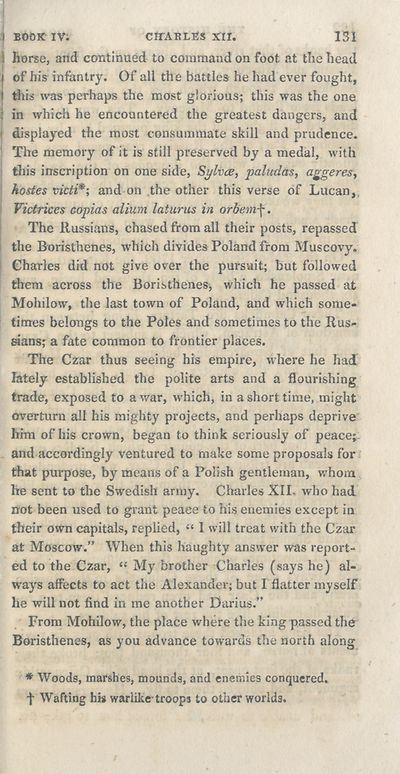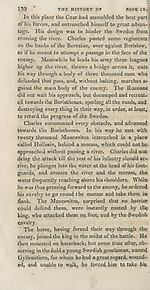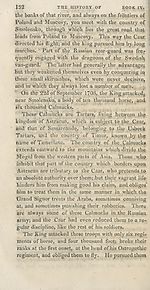Download files
Complete book:
Individual page:
Thumbnail gallery: Grid view | List view

1 BOOK IVi CITABLES XII. 131
I horse, arid continued to command on foot at the head
of his infantry. Of all the battles he had ever fought,
this was perhaps the most glorious; this was the one
in which he encountered the greatest dangers, and
displayed the most consummate skill and prudence.
The memory of it is still preserved by a medal, with
this inscription on one side, Sylvez, palttdas, aggeres,
hostes victi*; and on the other this verse of Lucan,
Victrices capias alium laturus in orbemf.
The Russians, chased from all their posts, repassed
the Boristhenes, which divides Poland from Muscovy.
Charles did not give over the pursuit; but followed
them across the Boristhenes, which he passed at
Molnlow, the last town of Poland, and which some-
! times belongs to the Poles and sometimes to the Rus¬
sians; a fate common to frontier places.
The Czar thus seeing his empire, where he had
lately established the polite arts and a flourishing
trade, exposed to a war, which, in a short time, might
orverturn all his mighty projects, and perhaps deprive
him of his crown, began to think seriously of peaces
and accordingly ventured to make some proposals for
that purpose, by means of a Polish gentleman, whom
he sent to the Swedish army. Charles XII- who had
not been used to grant peace to his enemies except in
their own capitals, replied, “ 1 will treat with the Czar
at Moscow.” When this haughty answer was report¬
ed to the Czar, “ My brother Charles (says he) al¬
ways affects to act the Alexander; but I flatter myself
he will not find in me another Darius.”
From Mohilow, the place where the king passed the
Boristhenes, as you advance towards the north along
* Woods, marshes, mounds, and enemies conquered,
t Wafting hi* warlike-troops to other worlds.
I horse, arid continued to command on foot at the head
of his infantry. Of all the battles he had ever fought,
this was perhaps the most glorious; this was the one
in which he encountered the greatest dangers, and
displayed the most consummate skill and prudence.
The memory of it is still preserved by a medal, with
this inscription on one side, Sylvez, palttdas, aggeres,
hostes victi*; and on the other this verse of Lucan,
Victrices capias alium laturus in orbemf.
The Russians, chased from all their posts, repassed
the Boristhenes, which divides Poland from Muscovy.
Charles did not give over the pursuit; but followed
them across the Boristhenes, which he passed at
Molnlow, the last town of Poland, and which some-
! times belongs to the Poles and sometimes to the Rus¬
sians; a fate common to frontier places.
The Czar thus seeing his empire, where he had
lately established the polite arts and a flourishing
trade, exposed to a war, which, in a short time, might
orverturn all his mighty projects, and perhaps deprive
him of his crown, began to think seriously of peaces
and accordingly ventured to make some proposals for
that purpose, by means of a Polish gentleman, whom
he sent to the Swedish army. Charles XII- who had
not been used to grant peace to his enemies except in
their own capitals, replied, “ 1 will treat with the Czar
at Moscow.” When this haughty answer was report¬
ed to the Czar, “ My brother Charles (says he) al¬
ways affects to act the Alexander; but I flatter myself
he will not find in me another Darius.”
From Mohilow, the place where the king passed the
Boristhenes, as you advance towards the north along
* Woods, marshes, mounds, and enemies conquered,
t Wafting hi* warlike-troops to other worlds.
Set display mode to:
![]() Universal Viewer |
Universal Viewer | ![]() Mirador |
Large image | Transcription
Mirador |
Large image | Transcription
| Antiquarian books of Scotland > Kings & rulers > History of Charles XII, King of Sweden > (149) |
|---|
| Permanent URL | https://digital.nls.uk/115022798 |
|---|
| Description | Thousands of printed books from the Antiquarian Books of Scotland collection which dates from 1641 to the 1980s. The collection consists of 14,800 books which were published in Scotland or have a Scottish connection, e.g. through the author, printer or owner. Subjects covered include sport, education, diseases, adventure, occupations, Jacobites, politics and religion. Among the 29 languages represented are English, Gaelic, Italian, French, Russian and Swedish. |
|---|

